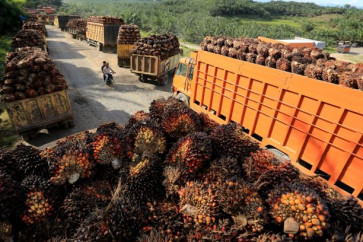Popular Reads
Top Results
Can't find what you're looking for?
View all search resultsPopular Reads
Top Results
Can't find what you're looking for?
View all search resultsFood protectionism and triple taxation in palm oil
Restricting the market of basic necessities at the government-fixed low prices usually causes long lines of consumers who tend to buy more than what they actually need.
Change text size
Gift Premium Articles
to Anyone
D
omestic palm oil prices are still way below the all-time highs of Rp 3,500 (24 US cents) to Rp 4,000 per kilogram even more than two weeks after the export ban was lifted on May 23. Oil palm smallholders have been crying out because their fresh fruit bunches (FFBs) fetch less than 50 percent of what their Malaysian counterparts enjoy.
Food protectionism somehow causes loss-loss situations. Countries that limit or restrict the export of their food commodities may look happy as the domestic supply is secured at low prices. But at the expense of the trading system. In the short term, the cost of the antimarket measure does not appear in the state budget as food subsidies can be avoided. But there are big opportunities lost at every value chain level, including the loss of potential government income.
This short-sighted strategy only encourages speculation, domestically and internationally. International trade is an essential component of food security. Restricting the movement of foods exacerbates tensions, maintains a chronic shortage of supply and can cause imported and domestic inflationary spirals without solving the problems.
Food protectionism through the imposition of Domestic Market Obligation (DMO) at the fixed domestic price obligation (DPO) is simply another face of rationing. Rationing is the practice of controlling the free distribution of a good or service to cope with scarcity or rising prices.
Examples from the regulated domestic prices of gasoline and diesel oil showed that restricting the market of basic necessities at the government-fixed low prices usually causes long lines of consumers who tend to buy more than what they actually need. Down the line this causes government subsidy spending to balloon. Rationing also creates black markets and unethical practices as many try to evade the restrictions.
Now we can see that Indonesia is harvesting what it has sown with the series of emotionally charged policies it introduced in January to stabilize the steeply rising domestic cooking oil price since late 2021.
The total ban on palm oil products slapped on April 28 has caused the storage tanks of most palm oil companies to become overflown, consequently pushing down the price of smallholders' FFBs by more than 50 percent as most big companies stopped buying new basic materials.



















